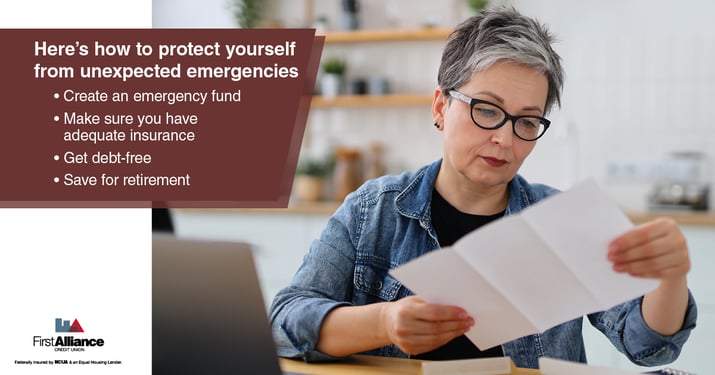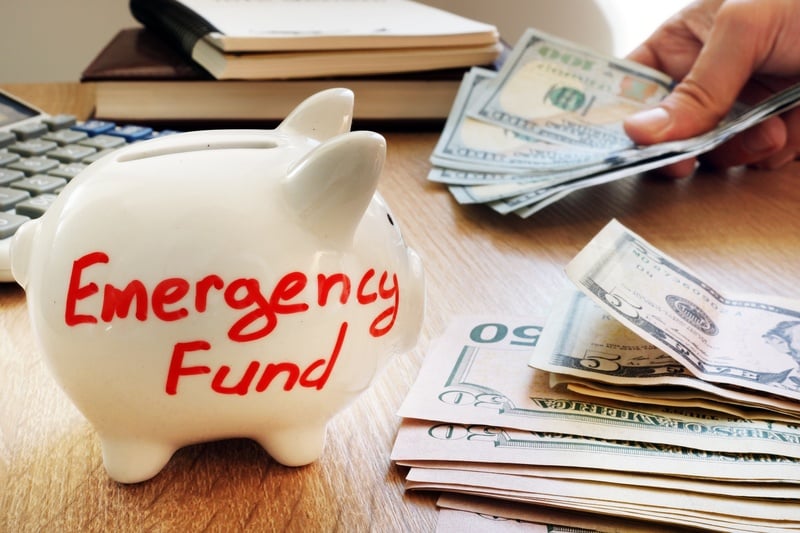5 Reasons to Build an Emergency Fund ASAP
Everything could be okay right at this moment. You have enough money in the bank, both you and your partner could have good jobs, and the two of you...
7 min read
 Chris Gottschalk
:
Oct 24, 2023 4:45:00 AM
Chris Gottschalk
:
Oct 24, 2023 4:45:00 AM

The scary thing about emergencies is that they can and do happen anytime, anywhere. No matter how careful you are, eventually you’ll get blindsided by an emergency.
Having said that, you don’t just have to cower and pray that an emergency never happens. You can take steps to build a financial safety net that will protect you from emergencies and unforeseen expenses. It might not prevent an unexpected emergency from happening, but it will minimize the damage an emergency does, not just to your financial well-being, but to your emotional well-being as well.

The absolute best way to safeguard yourself against an unexpected emergency is by creating a financial safety net that can shield you from an emergency of any size. You might think that a financial safety net is nothing more than an emergency fund, but the truth is that a robust safety net has multiple factors, and the more strands your safety net has, the more prepared you’ll be to withstand any emergency.
An emergency fund should be at the core of every financial saving net. When you have a robust emergency fund in place, you’ll be able to cover almost any emergency expense that arises, from car repairs to losing your job.
An emergency fund doesn’t just protect you from emergencies by giving you the ability to pay them off, though. It also protects your financial stability, since you won’t have to cover an emergency with a credit card or personal loan. In fact, an emergency fund even protects you from the mental stress and anxiety that many people feel when they have an emergency, since you won’t have to worry about where you’ll get the money to pay for the emergency.
According to financial advisors, you should aim to save 3-6 months' worth of salary. However, the amount you should save depends on your individual circumstances, including income, expenses, and debts. In fact, with the rise in inflation, you might even want to set aside 8 months of salary if possible.
Once you know how crucial an emergency fund is, the next step is figuring out how to start one. The best way to start is by looking through your monthly budget and figuring out how you can set aside each month. A good primary goal is to save 10% of each paycheck, but if you can’t do that try to save as much as you comfortably can.
Remember that you don’t need to cut from any one budget category. You can take small amounts for multiple budget categories to fund your emergency savings, especially discretionary expenses like:
You can also make saving for your emergency fund a lot easier when you use automatic transfers to fund it. The most common way to do that is by using Direct Deposit to split your paycheck between multiple accounts. For instance, you can have 10% of each paycheck automatically put in a savings account. Once you've done that, all you have to do is sit back and let your cash reserve grow.
While it’s always good to have an emergency fund to cover unexpected expenses, having the right insurance can prevent the cost of a financial emergency from skyrocketing beyond what you can afford to pay. Having the right insurance coverage for your situation can keep emergency costs manageable.
Nothing can derail your finances like a trip to the emergency room or a visit to the doctor that results in multiple medical appointments and thousands of dollars in medical bills. Health insurance, though, can help keep the average cost of your medical needs manageable.
While the Affordable Care Act does give you the option to select your own health insurance plan, most people usually go with the health care plan their employer provides. What this means is that you need to know what exactly your health insurance covers—and what it doesn’t cover—to make sure you have adequate coverage.
Once you know what coverage your health insurance offers and how much you’ll have to pay before your health insurance takes care of the costs, you can start to figure out how much you’ll need to have available at all times if a health emergency arises. Make sure you’re familiar with:
From there, you might want to make a new category in your budget specifically for handling medical expenses, especially medicine co-pays if you have a chronic condition like asthma.
Lately, some companies have started offering high-deductible health insurance to their healthcare plan participants. This means that you’ll have to pay for all your medical expenses up to somewhere between three and five thousand dollars. However, you’ll also get a Health Savings Account, also known as an HSA, where you can store money specifically for medical expenses.
One of the key benefits of HSAs is that the funds you contribute are tax-free, allowing you to maximize your savings potential. Make the most of your HSA by contributing to it regularly, ensuring that your savings will grow steadily over time.
Disability insurance provides crucial income protection if you find yourself unable to work due to illness or injury. It acts as a safety net, covering a portion of your income during such unexpected emergencies. This ensures that you can maintain financial stability and meet your ongoing expenses, such as mortgage payments, car repairs, and utility bills.
If you’re selecting a disability policy, take into account factors like:
Life insurance isn’t for you, so much as it is for your family. If something happens to you, your loved ones will get money to help them cover expenses like funeral costs, outstanding debts and ongoing living expenses.
Different types of life insurance policies are available to cater to different needs and budgets. In order to figure out how much life insurance you should get, your best bet is to consult with a financial planner.
Homeowners insurance can save you a fortune in home repair bills if disaster strikes, not to mention the cost of replacing your personal belongings. Make sure you get a homeowners policy that is sufficient to help you replace or rebuild your home if needed, and check to see what kinds of damage any potential policy does and does not cover.
If you're not a homeowner, you might want to consider renters insurance to protect their personal belongings. It's also worth mentioning some landlords actually require it from their tenants.
Auto insurance is usually a requirement for driving anyway, but you'll want to consider whether you want to get a policy that covers damages, and if so, how much you'll want to pay for a deductible. If you've already got money saved in your emergency fund, consider getting a policy with a higher deductible that has a lower cost. You'll save money in the long run.
If you're driving an old car, though, you may want to consider forgoing collision coverage entirely and put that money toward a new car instead. Collision coverage usually only covers the value of the car if it's totaled in an accident, and the older your car is the less it's worth.
If you’re wondering whether you stumbled into another blog by accident, we understand. However, even at the best of times debt ties up your money, and the more debt you have the less money you have available to prepare for an emergency—or cover an emergency when it arises. If you’re going to protect yourself from an unexpected emergency, you need to make sure your debts are under control.
Fortunately, there are several strategies to help you pay off your debts. These can include:
If you have multiple debts, you might also want to consolidate them by getting a loan for the total amount of debt you owe. You then use that money to pay off your debts, and then pay off the loan.
Debt consolidation has two huge benefits. The first is that it condenses your payments into one convenient monthly payment. The second benefit is that you can potentially save money, since debt consolidation loans usually have lower interest rates than other debts, especially credit cards.
You can also get help paying off your debts by using the First Alliance debt consolidation worksheet. It can help you organize your debts and aid in figuring out the best strategy to pay them off.

No matter who you are, at some point you’ll retire. The more you can set aside for your retirement, the less stressed you’ll be when it is time to retire—and you’ll actually get to choose when you retire instead of being forced to due to bad health.
Retirement isn’t technically an emergency. However, it requires substantial financial resources. Without proper savings, covering living expenses can be challenging. Additionally, unexpected health issues or other unexpected emergencies can quickly deplete retirement savings. Planning for retirement ensures a financial safety net in later years and reduces reliance on social security benefits.
Determining your retirement savings goal is the first step in securing a comfortable future. Calculate how much you need to save each month based on your desired lifestyle. Explore different retirement savings options, such as employer-sponsored plans and individual accounts, to maximize your savings potential.
You’ll also want to take advantage of any employer match contributions to boost your retirement funds. Regularly monitor and adjust your savings plan to stay on track towards your retirement goal. By starting early and making informed decisions, you can ensure financial stability in your later years.
Emergencies can strike at any time. However, you can protect yourself against them if you have a strong financial safety net. An emergency fund will be the main component of any financial safety net, but don’t neglect the other strands of the net, like insurance, retirement and even staying debt-free.
You can also help protect yourself from unexpected emergencies by taking advantage of the services at First Alliance Credit Union. You can put your emergency fund in a high-yield savings account to make it grow faster, take out a loan to consolidate your debts and even create a budget using our free downloadable budget worksheet.

Everything could be okay right at this moment. You have enough money in the bank, both you and your partner could have good jobs, and the two of you...

While there are some really good horror films being made today, the old Universal Classics still seem to be in a league of their own. Maybe it’s...

Family vacations can be wonderful events (especially after being cooped up for the last 12 months!) that will give you and your children memories...